Highlights
OUR SCHOOL
Celebrating 90 years
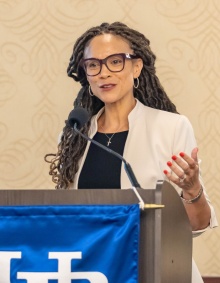
Photo: Heather Bellini
The School of Social Work has been advancing the dignity and worth of humankind since 1934. Last fall, we capped off our yearlong 90th anniversary celebration with a pair of events that brought together alumni, students, faculty, staff and community partners.
At left, award-winning professor, writer and media host Melissa Harris-Perry was the featured speaker for our 90th Anniversary Lecture and Celebration, sharing her perspective on the complexity of equity and how we can advance justice through social work.
Then, on a chilly November morning, below, we teamed up with the Tool Library to plant trees in Buffalo’s McCarthy Park.
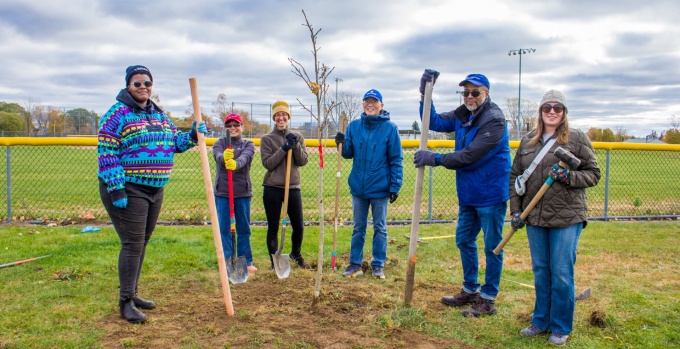
Photo courtesy of the Tool Library.
MEET THE TEAM
Welcoming two faculty members
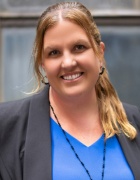
Brenda McQuillan
The School of Social Work welcomed two new faculty members last fall: Clinical Associate Professor Brenda McQuillan, PhD, LCSW, and Assistant Professor Enoch Azasu, PhD.
McQuillan has over 25 years of experience as a social worker across multiple settings, including a school district, foster care agency, child and adolescent psychiatry outpatient clinic, juvenile detention center and children’s advocacy center. She earned her PhD in health practice research from the University of Rochester. In addition to teaching full time at UB, she runs a private practice in Rochester, New York, and provides clinical supervision for emerging mental health therapists through a teletherapy agency in New York City.
“I am passionate about many things, all of which revolve around the dignity and worth of youth,” McQuillan says.
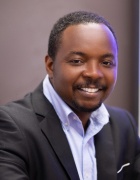
Enoch Azasu
Azasu centers his research on global mental health and suicide prevention, with a focus on understanding suicidality through culturally appropriate interventions. He earned his PhD in social work from Washington University in St. Louis. Azasu’s research has been published widely in academic journals, and he has been honored with several awards and fellowships, including the Global Visionary Innovators Shaping Tomorrow’s Advancements award from the National Institute of Mental Health, which recognizes mental health leaders who push the boundaries of knowledge.
“In addition to my passion around advancing mental health research, I am dedicated to community engagement through my work with organizations like Youth Awake to Mental Health Ghana and Youth Awake to Suicide,” says Azasu.
GOOD NEWS
Confronting barriers, increasing access
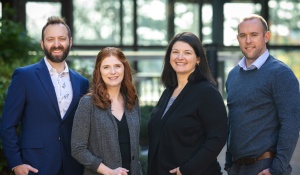
From left, Rubin, Stalker, Ball and Lynch. Photo: Meredith Forrest Kulwicki.
The School of Social Work has been awarded a $3.59 million grant from the U.S. Department of Education to develop a fellowship for MSW students and increase the number of school social workers in rural areas.
This fall, the school plans to launch the Buffalo Mental Health Service Professional (MHSP) fellowship, in partnership with Erie 1 BOCES. Buffalo MHSP fellows will receive intensive training and coursework to address the mental health issues facing students and families in rural communities. Fellows will also complete their advanced year field placements in the Alden, Akron, Niagara-Wheatfield or Medina school districts.
A second component of the program, called UB STARS (Small Towns and Rural Schools), will recruit MSW students to UB from the participating rural communities, thus helping to grow the workforce pipeline from within each community.
“Compared to children in metropolitan and urban areas, children in rural communities have higher rates of depression, suicidality and other mental health conditions,” says Katie C. Stalker, associate professor and director of field education, who serves as principal investigator on the grant. “This program prepares our MSW students for the unique concerns found in these rural schools.”
Faculty members Annahita Ball, Alexander Rubin and Michael Lynch are also partners on the grant.
ON THE PODCAST
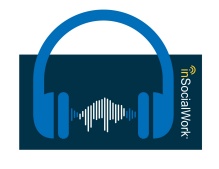
Social work in the post-Dobbs era
“Abortion is so stigmatized, controversial and a hot button issue that even social work has been hesitant to make it a primary component of the things we talk about and advocate for, even though reproductive health care affects everything.”
— Gretchen Ely, professor and PhD program director at the University of Tennessee, Knoxville, College of Social Work, during an episode on the state of reproductive health care more than two years after the U.S. Supreme Court overturned Roe v. Wade.
RESEARCH SPOTLIGHT
Grant-funded project aims to prevent targeted violence, terrorism

Patricia Logan-Greene
After the 2022 Tops mass shooting in Buffalo, Gov. Kathy Hochul signed an executive order mandating that all counties in New York State develop prevention networks to identify and confront threats of targeted violence. According to Associate Professor Patricia Logan-Greene, these networks will rely heavily on social workers and other behavioral health professionals, who have been called to engage in prevention efforts ranging from addressing community risk to rehabilitating radicalized individuals.
Funded by a $370,500 grant from the U.S. Department of Homeland Security, Logan-Greene is leading a project to assess current knowledge and practices around targeted violence and terrorism prevention and develop a series of online training programs for behavioral health workers across the state.
“We are in an era of rapidly increasing violence that is both targeted and politically motivated,” she says. “When individuals and hate groups are empowered to violence, there’s an increased need for trained professionals in the behavioral and mental health disciplines to prevent that violence, not only from those who are already radicalized, but also to strengthen communities and prevent future threats.”
WHAT'S NEW
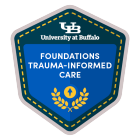
How to apply trauma-informed principles at work
Individuals can learn how trauma-informed principles can benefit employees across their organization, thanks to a new micro-credential program from the school’s Institute on Trauma and Trauma-Informed Care (ITTIC).
Through the Foundations of Trauma-Informed Care micro-credential, participants will understand how trauma affects people and how they can be sensitive to trauma in their role and within their team or agency.
There are two ways to earn the micro-credential: by completing ITTIC’s self-paced Basics for All Staff: Online Trauma-Informed Course, or by contracting with ITTIC for 12-15 hours of customized training for their organization. In both cases, participants will learn “trauma 101,” develop strategies to implement a trauma-informed approach and demonstrate their new skills.
“During our trauma-informed care training, we had conversations about difficult topics, realized new things about ourselves, gained insight on how to manage others without doing additional harm, and received tools to meet others where they are in a compassionate manner,” says Ericka White, benefits and wellness lead at Telamon, a North Carolina-based nonprofit.